Copyright timesofmalta

Across the democratic world – and Malta is no exception – political indifference has become one of the defining crises of our age. Voter turnout may remain locally relatively high, yet, many citizens approach politics as passive spectators rather than as engaged participants. The fault lies not only in political systems or leadership but in the deeper foundations of our civic culture: our education, our public discourse and our ability to think critically about the common good. Democracy depends not merely on votes but on judgement – on citizens capable of weighing evidence, recognising manipulation and participating in the shared search for truth. When those habits of reasoning are absent, political choices become increasingly erratic. Populism fills the vacuum left by reflection. As I argue in my recent essay, Against Indifference: Political Education and the Rise of the Philosopher-Citizen, the renewal of democracy begins not with new parties or slogans but with the reawakening of philosophical education. Modern education often measures success by employability alone. Yet, as Aristotle taught, education is ultimately about phronesis – practical wisdom – the capacity to act rightly and reasonably in the service of the common good. When schools and universities neglect this moral and civic dimension, they produce specialists rather than citizens. It is no coincidence that many young people today feel both politically disillusioned and intellectually under-equipped to understand the world around them. They were taught to achieve, not to deliberate. The roots of this problem go deeper than simple disinterest. They lie in what I call the neglect of philosophical education – the failure to teach how to reason, to question and to discern. Without these skills, democratic societies are easily seduced by strongman politics and simple certainties. We need only recall how, in the last century, whole nations turned to demagogues who promised order and pride in place of truth and justice. The lesson remains urgent today: the absence of critical thinking is the seedbed of authoritarianism. Here in Malta, we too face the quiet corrosion of civic confidence. Many citizens vote out of habit rather than conviction, while others withdraw altogether, believing that nothing will ever change. Particularly when informed that financial well-being takes precedence over corruption. But democracy cannot survive on cynicism. It needs citizens who think – citizens who care enough to ask difficult questions, who distinguish truth from propaganda and who recognise that politics is not a game of power but a shared pursuit of the good. This is what I mean by the philosopher-citizen. Not an ivory-tower thinker detached from real life but an ordinary person capable of reflection – someone who applies ethical reasoning to public life, guided by principles rather than impulses or self-interest alone. Such citizens do not need to be professional philosophers; they need to be philosophically minded. They understand, as Habermas reminds us, that democracy rests on deliberation – on dialogue grounded in respect, reason and truth. Alan Xuereb is a lawyer-linguist.



